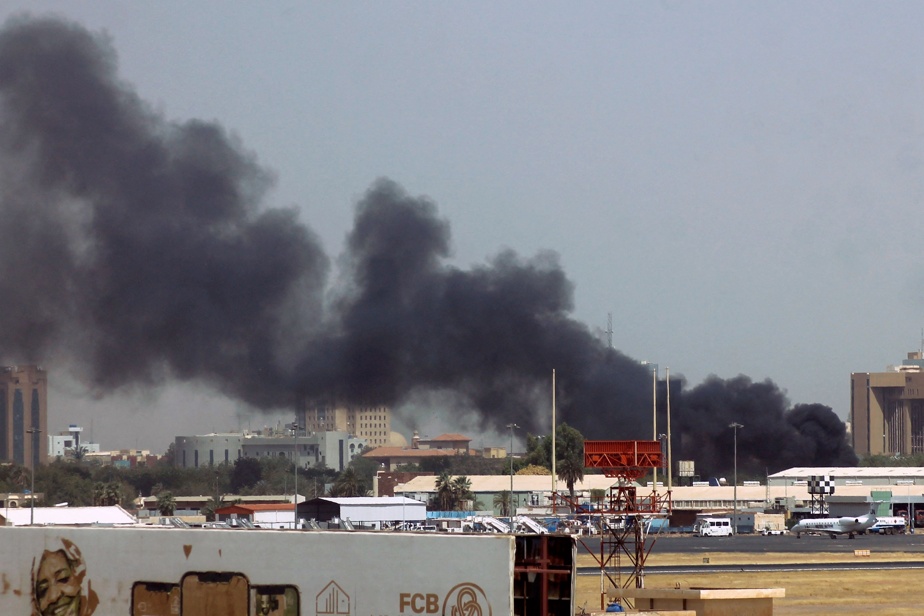(Khartoum) Three civilians were killed on Saturday in Sudan where the rivalry between the two generals in command since the putsch of 2021 degenerated into street fights, air raids and threats through the media.
The paramilitaries “will not stop until they take control of all the military bases”, threatened, speaking quickly and loudly on the phone on Al-Jazeera channel, their commander, General Mohamed Hamdane Daglo, said. “Hemedti”.
And calls for an “immediate” ceasefire—from the UN, Washington, Moscow, the African Union, the Arab League, and even former civilian prime minister Abdallah Hamdok—are not there. do nothing.
Deployed in Khartoum since the morning, these Rapid Support Forces (RSF) — thousands of ex-Darfur war militiamen turned army auxiliaries — said they had taken over the international airport and the presidential palace.
The head of the army, General Abdel Fattah al-Burhane, claims to have been “surprised at nine o’clock in the morning” by an attack on his headquarters by the FSR, his former best ally whom the army now describes as ” foreign-backed militia” to carry out his “treason”.
On both sides, no more hushed negotiations under the aegis of diplomats and other civilized discussions, the army mobilized its planes to strike – and “destroy”, she says – RSF bases in Khartoum. Hemedti, he agonized over Al-Jazeera his insult rival: he is a “criminal” who “destroyed the country”, he launched.
The 45 million Sudanese awoke abruptly in the middle of the Ramadan fast and under a blazing sun, to the sound of heavy weapon fire and explosions in Khartoum and several other cities.
According to an initial report from the official doctors’ union, three civilians were killed – two in Khartoum and one in El-Obeid (south).
The two sides are now vying for control of the state media headquarters, witnesses say, as the once weak television signal appears to have ceased.
In the same suburb of Omdurman, a BBC Arabic journalist was “beaten by a soldier” as he tried to explain that he was on his way to work, according to his channel.
During the putsch, Hemedti and Burhane formed a common front to oust civilians from power. But over time, Hemedti has consistently denounced the coup.
Even recently, he sided with civilians — therefore against the army in political negotiations — blocking discussions and therefore any solution to the crisis in Sudan.
For days, the street had been buzzing with rumors of an impending guerrilla war between the two camps. On Saturday morning, Khartoum woke up to the sound of heavy and light gunfire and almost non-stop explosions.
In a few hours, the FSRs announced that they had taken Khartoum international airport, in the heart of the capital, then the presidential palace where General Burhane usually sits, as well as the palace reserved for state guests, an airport in the north of the country and “other bases in different provinces”.
The army denies the seizure of the airport, but assures that the FSR “infiltrated there and set fire to civilian planes, including one from Saudi Airlines”. The company in Riyadh said one of its aircraft was damaged by gunfire at Khartoum airport.
For their part, the FSR call on the population and the military to “join them” and to turn against the army.
Residents are confined to their homes. “Like all Sudanese, I remain sheltered,” tweeted US Ambassador John Godfrey. “The escalation of tensions between the military to direct confrontation is extremely dangerous. I call on senior military commanders to stop fighting immediately,” he wrote.
The army accuses the RSF of initiating hostilities by attacking army bases “in Khartoum and elsewhere”, its spokesman, General Nabil Abdallah, told AFP. General Burhane added in a statement to Al-Jazeera that he had been “surprised by an attack on (his) HQ at nine o’clock in the morning”, without specifying whether he was there or had been evacuated.
The RSF say they were “surprised in the morning by the arrival of a large army contingent which besieged their camp in Soba”, in the south of Khartoum, and “attacked them with all kinds of heavy weapons and light.”
For experts, the two commanders were raising the stakes as civilians and the international community try to get them to sign a political agreement supposed to relaunch the democratic transition.
The dispute between the two strong men concerns the future of the paramilitaries: the army does not refuse their integration into the regular troops, but it wants to impose its conditions of admission and limit their incorporation in time. General Daglo wants broad inclusion and, above all, his place within the general staff.

